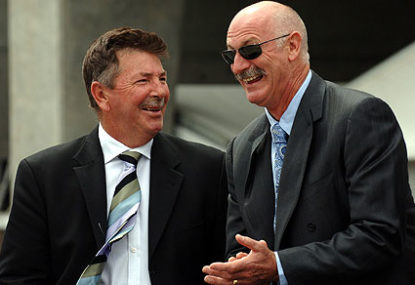How I long for my teenage years – roughly 1995 to 2005. Not because now I’m a bit podgier, a little slower, and can’t recover from a hangover nearly as well.
I miss these days because Australia was unbeatable at everything.
The cricketers were legendary. We had the likes of Ricky Ponting, Adam Gilchrist, Damien Martyn, and the Waugh brothers dismantling bowling attacks with an almost inhumane ease.
Openers Matthew Hayden and Justin Langer had the bromance that every man wants with his mate.
Glen McGrath and Shane Warne would strangle opponents, more than ably supported by Jason Gillespie, Michael Kasprowicz, or Damien Fleming. Stuart MacGill was our backup spinner. Hell, even Colin ‘Funky’ Miller took 69 wickets at 26.15.
The Wallabies were pretty decent too. In that ten year period they won a World Cup, made another World Cup final, and a couple of Tri-Nation and Bledisloe Cups.
Ah, how we would love another Stephen Larkham, Matt Burke, Totai Kefu, Stirling Mortlock or Owen Finnegan right now.
Towards the end of this time, football burst on to the scene as the golden generation of Mark Viduka, Harry Kewell, Mark Schwarzer, John Aloisi, Lucas Neill, Tim Cahill et al. come up with the goods.
They avenged defeat to Uruguay in the previous qualifying campaign to book a place in the 2006 FIFA World Cup, where they competed admirably.
In 2005, we also got a new toy – the A-League.
The swimmers were running amok. We had Kieran Perkins, Susie O’Neill, Ian Thorpe, Grant Hackett, Petria Thomas, and anyone else that didn’t need floaties to swim winning medals.
We had ‘our’ Cathy Freeman lighting up the Olympic torch and track at the 2000 Sydney games.
Perth boy Luc Longley was starting centre in the Michael Jordan-led Chicago Bulls domination of the NBA.
If you still doubt just how good we were, look at Steven Bradbury. He won the 1000m speed skating gold at the Winter Olympics just by being thereabouts.
So what’s changed? Where did these better times go? Don’t we just turn up and win just because we wear green and gold?
The answer is obviously no, but I’m not quite sure many professional athletes realise this.
The recent swimming sagas (not just the latest with the men’s relay team, also Stephanie Rice’s homophobic tweet, Kenrick Monk’s little white lie and Nick D’Arcy belting Simon Cowley), the Shane Watson and India ordeal, Quade Cooper and the toxic environment, Quade cooper in general, all reek of arrogance and a sense of entitlement.
It is even in the way the players behave on-field and go about their business. In the way cricketers tend to throw their wickets, or the rugby players expect miracle passes to pay off, or how the Socceroos turned up half asleep against Oman on Tuesday.
Most of the sports, when hitting this golden age, had come off a tough era.
Cricket had been torn apart by the rebel tours and a mediocre 1980s, and had only Allan ‘Captain Grumpy’ Border and Bob Simpson to thank for holding the ship together.
The Wallabies exited the 1995 World Cup at the quarter finals – as defending champions. Football had not had a golden age since Johnny Warren was around.
The 1980s were relatively lean pickings for our Olympians.
During these times, however, Australian sport seemed to be being infected with the underdog mentality. The urge to battle, no matter the odds. The ability to keep fighting and never give up became a national trait.
It was in wider society too – unemployment in Australia topped 11% in 1992. Times were tough, but so were Australians, and it seems we got going.
When the sporting talent did come, the sportspeople were not just skilled, they were mentally tough. They could battle. However, the spoilt brathlete today, seems to think they can turn up and win.
Well, newsflash boys and girls, you can’t. Things aren’t going to go your way.
It’s time for some humility, and realisation that you’re not the best in the world, and you’re going to have to train, and play darn hard to get there.
And no, tweeting is not training.





























































































